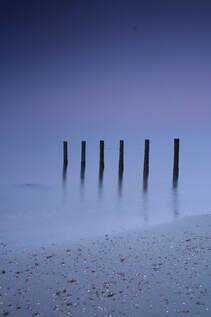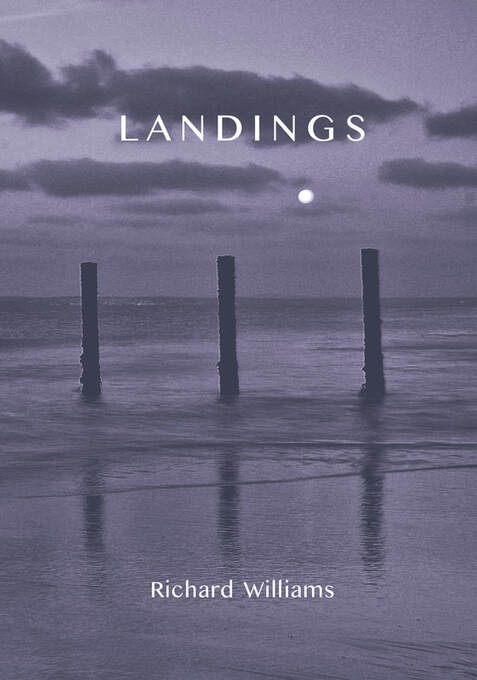LANDINGS by Richard Williams
|
Photograph © Richard Williams
|
Both of Richard Williams’s parents were originally from Portsmouth, but Richard was born in Birmingham in 1965, and grew up in Frome, subsequently living in London, before the pull of this city on the south coast became too great. Married with three children, living in a typical Pompey terraced house, Richard works in recruitment and has a sideline business as an online trader of art prints, photography & sporting memorabilia.
First poem to appear in print was in the Frome CND Newsletter back in 1983 (if anyone happens to have a copy...). Has subsequently had over 100 poems appear in various magazines, collections and online publications. Was on the committee of Tongues & Grooves in the Community for a number of years from 2009, and in that capacity arranged various events including poetry workshops at Haslar IRC, and screenings of Poems of Exile on the BBC Big Screens in Portsmouth and Dover. In his new collection, Landings, Richard Williams creates a nostalgic, tender, and thoughtful poetic portrait of his well-loved home of Portsmouth. The collection brims with history, emotion, and quiet reverence, letting the reader in on personal experiences and observations of the seaside town with an intimacy that feels like the sharing of stories between old friends. It’s as though something important and private is being revealed over the course of the text, causing the reader to wonder which local shop, historical moment, or stretch of coast they will become privy to next.
Sydney Whiteside in The High Window 'In Landings, Williams has created a new poetic map of Portsmouth based on a fascinating inner life lived in a city by the sea.'
George Monk in The Star and Crescent 'Language in this memorable collection is both precise and lyrical. In The Feng Shui shop on Fratton Road the area is bright with “sleet and oil and rainbows”. In Lighting up the chiminea the poet urges us to turn our backs on “the dying of the sun” and “mellow the dark in an orange glow” while remembering “Soft memories of gold” and allowing words to “dance to our shadows” before “terracotta turns cold”. There is a strong sense of place in this poem as there is throughout the collection, an emphasis on “this dusty earth,/this Hampshire chalk, these rolling fields” – all of which are being eroded as the past sifts “through our hands”. Dust is an image that predominates.
Landings begins with poems (The King of stationery and Contents of the loft of an eBay trader) which present a landscape, part rural, part suburban, where things are shrinking and marginal, missing, out of date, unused or discontinued. The world is also getting smaller in a remarkable prose piece (It was only his second ever day of being seven) where the current affairs the father reads about in a newspaper are juxtaposed with images of sweets and drinks that appeal to his young son. Eventually these images shrink to the size of a “small globe of sugar” which resembles “a ball of light at the beginning of time” and which the child, dipping back his head, swallows whole. ‘Landings’ is a strong collection of poems filled with nostalgia and sadness at loss. There is urgency too, a need to hang on to what is left and even to try and “restock futures left discarded” in a different ocean “full of fish and full of light.” (Map-making). A perfect image of hope.' Mandy Pannett 'From the Electric Arms and Istanbul Grill to the Feng Shui Shop on Fratton Road and the twice won FA Cup – the UK’s most densely populated city is Richard Williams' oyster. Portsmouth may be all about location, but how can we hang on to our dreams when surrounded by flat-fronted houses and disposable barbecues? Williams keeps his sensibility intact by transforming his observations into finely-tuned poems that go way beyond the provincial. In his powerful eponymous poem ‘Landings’, spanning Manchester to Mogadishu via the moon, he warns against passive voyeurism, as if ‘imagining could never be enough’. These imaginative poems evoke what it is to be human – they are celebratory, sad, funny and wise.'
Maggie Sawkins Winner of the Ted Hughes Prize for Poetry, 2014 |
|
On the success or otherwise of disposable barbecues
from LANDINGS Not like that time at West Wittering, a gaggle of teenage girls, enough matches to model a battleship. Each sparked a flicker of yellow soon extinguished; a barbecue that wouldn’t burn. Eventually we got it going, huddled bags and boxes around damp coal and spent splints of wood. The wind dropped enough for smoke to just about take hold, too fast the flames were done. This time we were promised instant light; for once the marketing spiel was true, and as the sky began to turn a mellower shade of gold, the last of the kite-surfers packed up and drove home. On the other side of the Solent, streetlamps from Ryde to Bembridge were necklaces of precious jewels. As charcoal embers glowed, we sank fingers into the shingle, took every breath as if it was our first. © Richard Williams |
|



